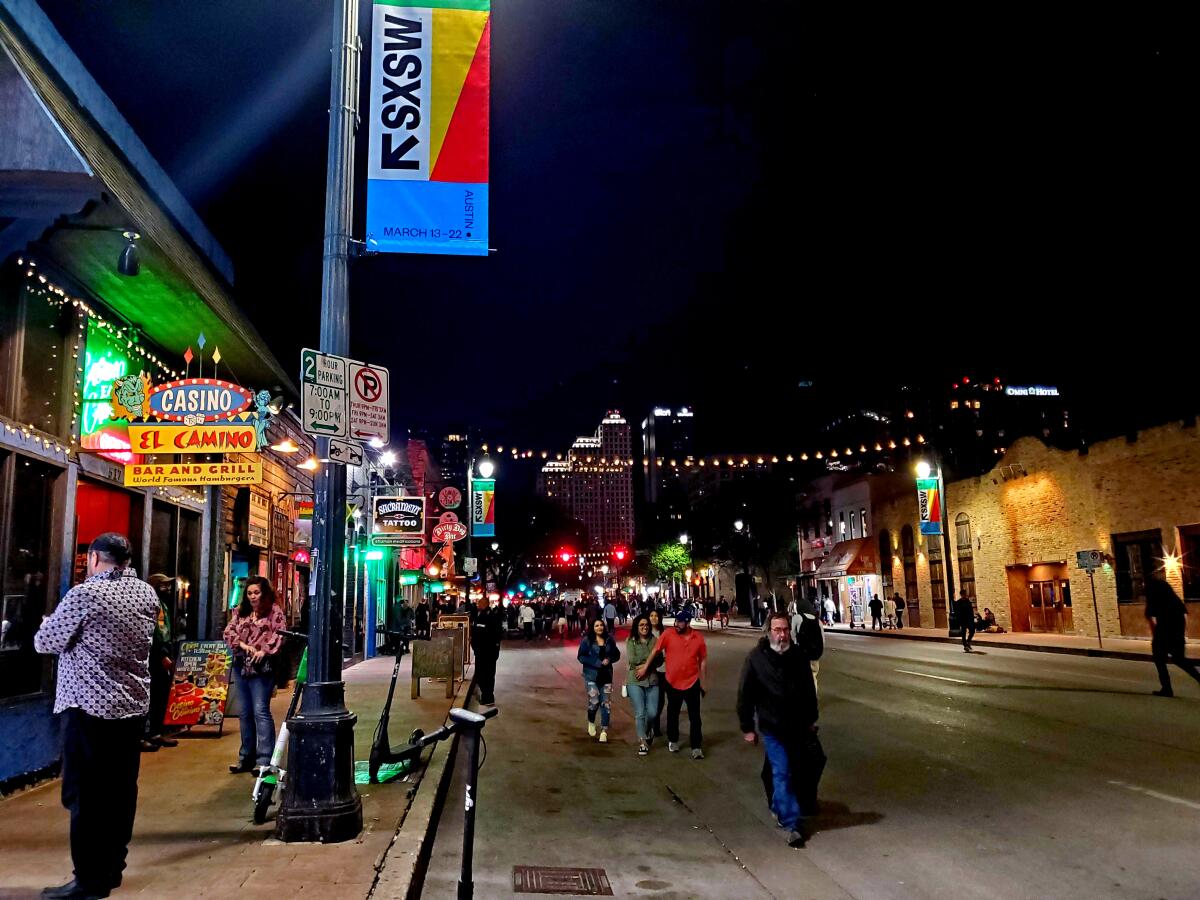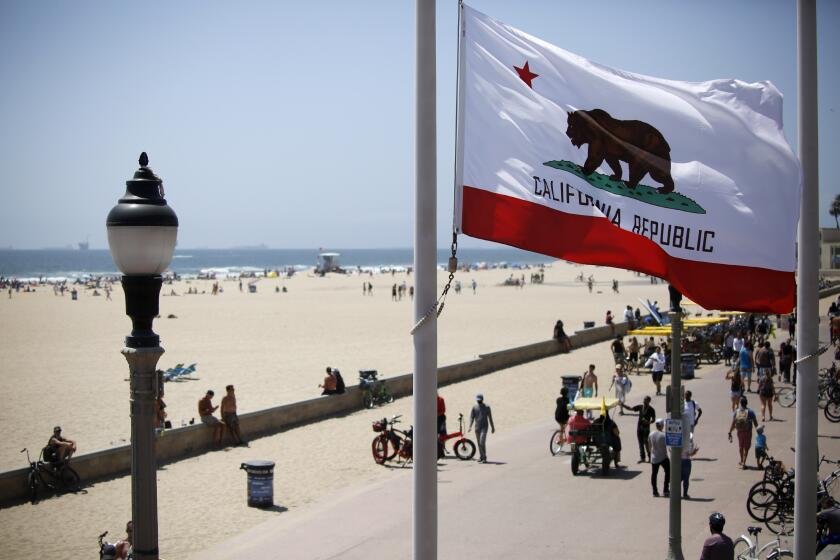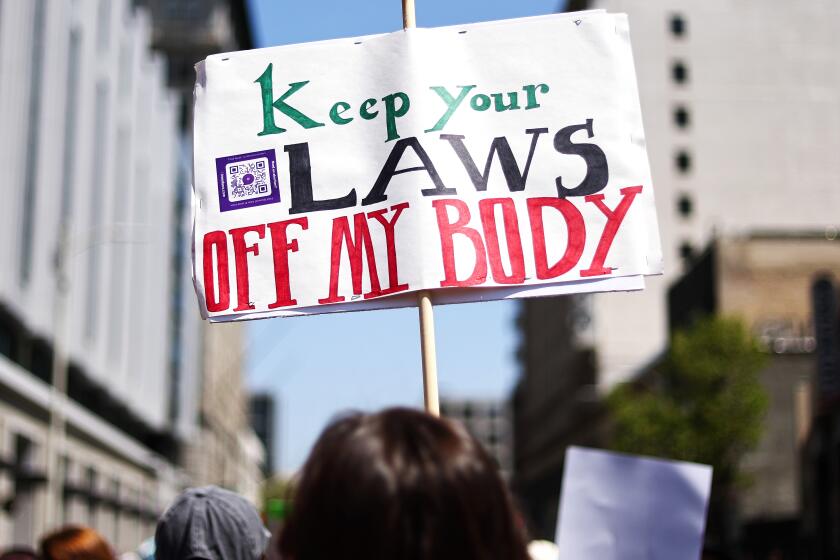Opinion: Texas is my home. But will it ever be ready to claim my Chinese immigrant family?

- Share via
When a piece in the New Yorker came out in February, chronicling the premeditated growth of Austin, Texas, once a hippie town, into a tech conglomerate and home to SpaceX, I saw my family’s story. My parents immigrated to the U.S. from China in the ’80s. They received master’s degrees in computer science from Oklahoma, where I was born, and in 1996 bought their first house in Austin. Land back then was abundant and cheap, the article said. That was one of the draws of forming a tech consortium there, an effort led by the Reagan administration.
My parents are both engineers. Many of the Chinese families I knew growing up had at least one parent who worked in tech. My mom was employed at IBM, later Dell. My dad preferred smaller companies and moved around at various startups in the area. Now the city is crowded with people my age, millennials, as the reign of Google and Amazon promises to lead us into the future. It’s hard to remember that Texas was once an oil empire and, before that, cattle country. Despite all the ways the state has changed, to this day Texas clings to the myth of the cowboy, that lonesome, taciturn figure who pulls himself up by the bootstraps to face life on the frontier. My family may not fit the stereotypical rugged white man in that image, but I have come to claim Texas as home. And I want Texas to claim me.
I endured my fair share of unpleasantness growing up Chinese in a predominantly white community. Aside from a racial slur in high school, I remember mostly microaggressions, which didn’t feel painful, back when I cared about seeming unflappable. In true Texas fashion, I developed thick skin. In college, after discovering feminism, I decided I needed to move far away, to a city that reflected the progressive views I now had a language for. That’s how I ended up in New York.
Young Texans starting their careers have been moving West for 15 years.
It wasn’t until I started writing stories set in Texas that I began to confront this part of my heritage. My imagination kept returning to the summers of my adolescence: trails that led to watering holes, my father at the grill, concerts at Red Eyed Fly, a venue that’s now closed. Rehearsing dance routines on a blacktop with 20 other girls in over 90-degree dry heat, in preparation for football season.
I’ve heard it said before that to love something is to see it accurately. I had to leave Texas to be able to see it. Texas is forward-gazing, embodying that American narrative of a so-called manifest destiny, but there’s something uniquely Texan too about the way the state charges stubbornly ahead, with a chip on its shoulder, determined to make a name for itself. Houston’s Astrodome, which has stood unused for over a decade, is quickly becoming a too-apt metaphor for a future many Texans fear: an impressive facade that recalls a bygone greatness, but that’s empty on the inside. Texas has become a place to watch in recent years, no longer the weird not-South-but-not-West cousin of the states surrounding it but a force all on its own, with policymakers who are hellbent on a regressive morality even as they strive for technological leadership.
I have tried many times to distance myself from my home state, in retaliation, because I felt it didn’t care for people like me or my parents. “Home” is a tricky concept, maybe especially for immigrants whose lives have been defined by leaving home and making another one elsewhere. But I see many resonances between the story Texans tell themselves and the one my parents have lived.
Cowboys and immigrants are both wanderers, after all. Both can seem like outsiders, never quite a permanent resident anywhere, and often treated with suspicion even as they’re mythologized for stepping willingly, courageously, into the wilderness.
As shootings and abortion bans made headlines this year, I felt my desire to claim Texas grow stronger. The rude awakening of having lived in New York for six years, and experiencing discrimination there as well, is realizing I might be perceived as an outsider anywhere I go in this country.
As I and many other Americans mark the Fourth of July, I realize I don’t have to wait for a place to welcome me. I can choose what to celebrate and how to identify and where to call home. I want the legacy of Texas to include immigrants, Black people, queer people, Indigenous peoples. I don’t want Texas to push us out of its story, which is why I’ve decided to embrace it as part of mine.
A year after the Supreme Court’s Dobbs decision, abortion foes want more, even if most Americans disagree.
I’m no Larry McMurtry. The “Lonesome Dove” author came from a Texas cattle family and grew up on a ranch. But my parents were there in the late ’90s and early 2000s, helping to make Austin into what it is today. And whatever love McMurtry felt for Texas that compelled him to write about it, I feel it too.
Every year when I was in elementary school, there was an event called the Wildflower Stomp, where all the kids gathered to literally stomp wildflower seeds into an open field nearby. Come spring, you could see the flowers from the road, streaks of bluebonnets and Indian paintbrushes that set the field ablaze. It amazed me every year that the flowers would bloom, appearing gentle, despite how violently we’d put them into the ground.
This is a core memory of mine now, both the stomping and the marveling at what came of it. I remember this because I was there, and because Texas has become part of me, coloring the depths of my imagination. I can’t forget Texas, so I’ll do what I can to make sure it can’t forget me.
Ada Zhang is a 2023 National Book Foundation 5 Under 35 honoree and the author of the recent short story collection “The Sorrows of Others.” @sorrowsofothers
More to Read
A cure for the common opinion
Get thought-provoking perspectives with our weekly newsletter.
You may occasionally receive promotional content from the Los Angeles Times.










